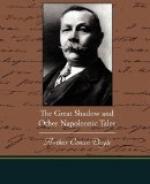CHAPTER XII.
THE SHADOW ON THE LAND.
It was still drizzling in the morning, with brown drifting clouds and a damp chilly wind. It was a queer thing for me as I opened my eyes to think that I should be in a battle that day, though none of us ever thought it would be such a one as it proved to be. We were up and ready, however, with the first light, and as we threw open the doors of our barn we heard the most lovely music that I had ever listened to playing somewhere in the distance. We all stood in clusters hearkening to it, it was so sweet and innocent and sad-like. But our sergeant laughed when he saw how it pleased us all.
“Them are the French bands,” said he; “and if you come out here you’ll see what some of you may not live to see again.”
Out we went, the beautiful music still sounding in our ears, and stood on a rise just outside the barn. Down below at the bottom of the slope, about half a musket-shot from us, was a snug tiled farm with a hedge and a bit of an apple orchard. All round it a line of men in red coats and high fur hats were working like bees, knocking holes in the wall and barring up the doors.
“Them’s the light companies of the Guards,” said the sergeant. “They’ll hold that farm while one of them can wag a finger. But look over yonder and you’ll see the camp fires of the French.”
We looked across the valley at the low ridge upon the further side, and saw a thousand little yellow points of flame with the dark smoke wreathing up in the heavy air. There was another farm-house on the further side of the valley, and as we looked we suddenly saw a little group of horsemen appear on a knoll beside it and stare across at us. There were a dozen Hussars behind, and in front five men, three with helmets, one with a long straight red feather in his hat, and the last with a low cap.
“By God!” cried the sergeant, “that’s him! That’s Boney, the one with the grey horse. Aye, I’ll lay a month’s pay on it.”
I strained my eyes to see him, this man who had cast that great shadow over Europe, which darkened the nations for five-and-twenty years, and which had even fallen across our out-of-the-world little sheep-farm, and had dragged us all—myself, Edie, and Jim—out of the lives that our folk had lived before us. As far as I could see, he was a dumpy square-shouldered kind of man, and he held his double glasses to his eyes with his elbows spread very wide out on each side. I was still staring when I heard the catch of a man’s breath by my side, and there was Jim with his eyes glowing like two coals, and his face thrust over my shoulder.




